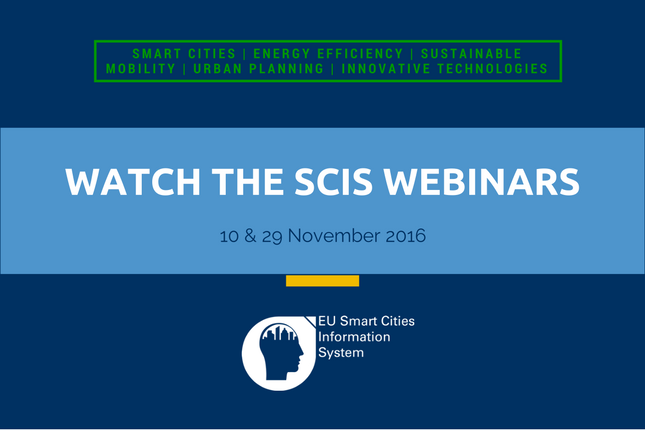
During the month of November the Smart Cities Information System (SCIS) held two webinars on “How to visualize results and KPIs from smart cities projects” and “Provision of data and results to the Smart Cities Information System”. For all those who couldn’t attend the sessions, the recordings are available online on the SCIS website.
The aim of the first webinar, “How to visualize results and KPIs from smart cities projects”, which took place on 10 November, was to answer the questions of how to communicate results from smart cities projects and how to visualize data and KPIs to promote learning and replication.
Antonio Garrido Marijuan, Junior Scientist at the Energy Department of the Austrian Institute of Technology (AIT) demonstrated the new SCIS website and the SCIS visualization approach based on the KPI guide, developed by the SCIS team, and the data collected from projects so far.
Jorge Nunez from the Centre for European Policy Studies (CEPS) presented the non-technical layer of information which SCIS gathers from projects –barriers they have encountered and how they have resolved them. Not accounting for these non-technical factors is a mistake when analyzing outputs of projects and knowledge of how such issues have been addressed in projects can help future projects to innovate and replicate.
The webinar offered participants the opportunity to give their evaluation through polls and questions regarding the content of the website and its level of detail, still lacking information, the best practices they would like to see and the replication potential of SCIS.
The second webinar ‘’Provision of data to SCIS’’, held on 29 November and led by Antonio Garrido Marijuan from AIT, illustrated to projects how they can easily upload information and results through the means of the SCIS’ new online self-reporting tool. The tool, which is still in its development phase, reduces the amount of data required for reporting and requests only the data essential for replication.
The SCIS team took the advantage of asking participants for their feedback which will be taken into account when improving the self-reporting tool further.
The testing phase will begin in December, where project coordinators and project experts in technical and economic assessment will be able to try out the tool and give recommendations based on their first-hand experience.
